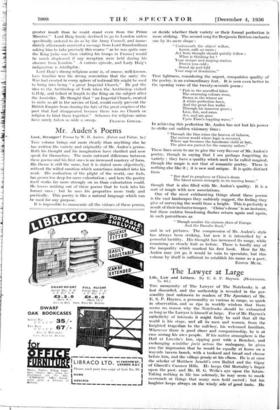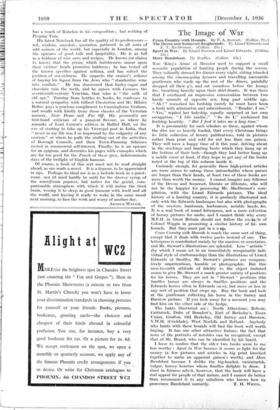The Lawyer at Large
Life, Law and Letters. By E. S. P. Haynes. (Heinemann. 7s. 6d.)
THE anonymity of The Lawyer of The Notebooks is at last discarded, and the authorship is revealed in the per- sonality (not unknown to readers of The Spectator) of Mr. E. S. P. Haynes, a personality so various in range, so quick in observation, and so ripe in worldly wisdom that there seems _no reason why the Notebooks should be exhausted so long as the Lawyer is himself at large. For of Mr. Haynes's catholicity of interests it might fairly be said that all the world is his stage, and all its men and women, from the knighted tragedian to the call-boy, his welcomed familiars. Wherever there is good cheer and companionship, he is at ease ambpg his own people. If his native atmosphere is the Hall at Lincoln's Inn, sipping port with a Bencher, and exchanging scinlillae juris across the mahogany, he gives you the impression that he would be equally at home on a wayside tavern bench, with a tankard and bread and cheese before him, and the village gossip at his elbow. He is at once the scholar of Matthew Arnold's own Balliol and the Gipsy of Glanvll's Cumnor Hills. He keeps Old Mortality's finger upon the past, and Mr. H. G. Wells's eye upon the future. Taking nothing in life too solemnly, he may seem to mock overmuch at things that many men hold sacred ; but his laughter keeps always on the windy side of good taste. He has a touch of Rabelais in his composition ; but nothing of Peeping Tom.
His latest Notebook has all the quality of its predecessors— wit, wisdom, anecdote, quotation, gathered in all sorts of odd corners of the world, but especially in London, among the epicures of good talk and hospitality. He is as full as a beldame of wise saws and,recipes. He knows (or claims to lorbw) that the greaSe which hairdressers smear upon their victims' heads prombtes baldness ; he has tested all the known specifics against asthma, and has solved the problem of sea-sickness. He suspects the cruiser's cellarer of buying his liquor' from the _Jews who " standardise wine into cordials." He has discovered that barley-sugar and chocolate ruin the teeth, and he agrees with Cornaro, the seventeenth-century Venetian, that wine is " the milk of old age." Turning" frombottles to books, he confesses to a natural sympathy with Gilbert Chesterton and Mr. Hilaire Belloc, pays a gracious compliment to Cunninghame Graham, and recalls with kindly irony those classics of the Victorian nursery, Near Home and Far Off. His personalia are first-hand criticism of a pungent flavour, as where he remarks of Lord Curzon's address in Balliol Hall, on the eve of starting to take up his Viceregal post in India, that " never in my life was I so impressed by the vulgarity of any oration," or where he pulls the stuffing out of the activities of Borough Councils, and their Town-Planning Schemes rooted in commercial self-interest. Finally, he is an epicure for an epigram, and decorates his pages with examples which are far too good for the Punch of these grey, indeterminate days of the twilight of English humour.
Of course, a book of this sort must not be read straight ahead,'as one reads a novel. It is a liqueur, to be appreciated in sips. Perhaps its ideal use is as a bedside book in a guest- room—not (it need hardly be said) for the drowsy syrup of the somniferum popover, but rather for the genial, com- panionable atmosphere with which it will imbue the tired brain, wooing it to sleep in good humour with itself and all the world, and leaving it ready to wake in the same mood next morning, to face the work and worry of another day.
ARTHUR WAUGIT.





















































 Previous page
Previous page